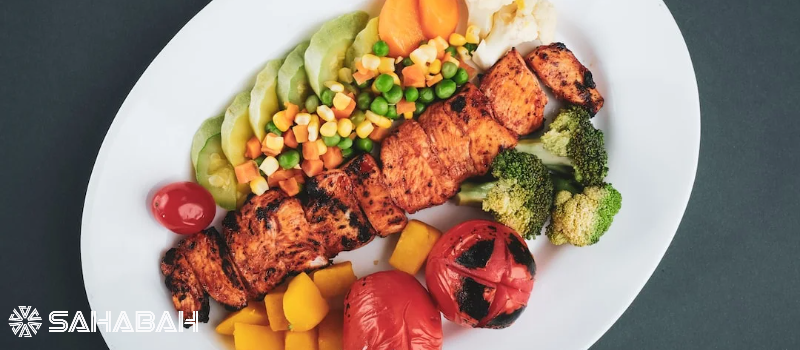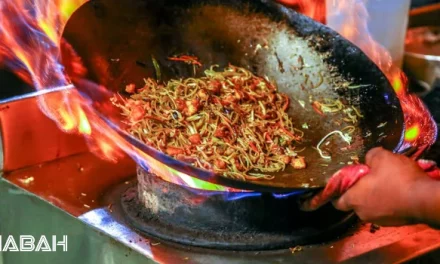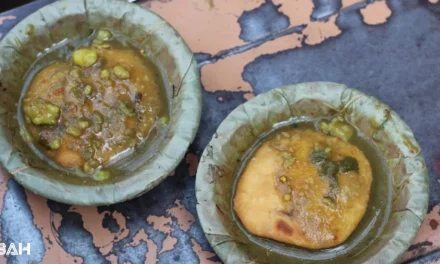Oporto is one of Australia’s most iconic homegrown restaurant chains. Founded in Sydney in 1986, they have grown across over 150 locations nationally on the back of their signature flame-grilled chicken and Portuguese-inspired burgers.
With Australia now home to over 700,000 Muslims, making up over 3% of the population, halal food has become a $12 billion consumer market. So for leading chains like Oporto, prioritizing proper halal certification is now crucial to continue thriving in Australia’s diverse, multicultural fast food environment.
This comprehensive guide reviews Oporto’s current halal certification status, halal menu options, and what Muslim consumers can expect from this much-loved brand in 2023 and beyond.
Understanding Halal Certification and Why It Matters
Halal is an Arabic term meaning permissible or lawful. When applied to food, it refers specifically to dietary guidelines set down in the Quran for followers of the Islamic faith.
For meat products and other food to be considered halal:
- The animal must be slaughtered by hand according to ritualised Islamic procedure, invoking Allah’s name
- All blood must be thoroughly drained from the carcass
- Pork and alcohol ingredients are strictly forbidden
- Prepared food must avoid any cross-contamination with non-halal substances
Halal certification is the administrative process granting formal approval that these religious standards have been properly met. It provides Muslim diners authoritative third-party verification that consumption of those products adheres with their obligations under Islamic sharia law.
Globally, over 70 countries now have formal halal certification bodies as independent regulators, including Australia’s two highest Islamic councils:
- Australian Federation of Islamic Councils (AFIC) – Umbrella advisor on Islamic affairs with state councils in NSW, QLD and WA.
- Islamic Council of Victoria (ICV) – Victoria’s peak Muslim body overseeing halal compliance.
These reputable agencies audit food companies, manufacturers and outlets nationwide according to strict halal criteria. Only once all guidelines are independently confirmed can official halal certification be granted.
For Muslim consumers, this assurance enables them to enjoy the convenience of modern dining options without compromising their deeply-held religious beliefs around permissible foods. As Australia’s Islamic population continues rising, conscientious companies recognizing halal requirements positions them to capture a fast-growing, socially conscious market.
Oporto’s Current Stance on Halal Certification
As of February 2023, Oporto Australia has NOT achieved universal halal certification across its entire 150+ restaurant network. Their current position is:
“We understand and respect the significance of halal certification to our Muslim customers. However, due to various operational complexities as a national fast food chain, acquiring consistent formal halal approval across every single Oporto outlet is difficult presently.”
While lacking complete certification, they note some locations and menu items still adhere to general halal standards:
“Certain products we prepare may meet basic halal criteria in their ingredients and cooking methods. But without having end-to-end third-party oversight verifying full sharia compliance, we cannot actively market items as officially ‘halal‘ until gaining such authoritative endorsement.”
This informal self-designation as “halal friendly” falls well short of guarantees devout Muslims demand when selecting permissible dining options. So for faith-conscious patrons, the absence of independent inspection crossing every “t” remains problematic.
Why Gaining National Halal Certification Is Challenging
Expanding a piecemeal halal program nationally has some major roadblocks Oporto is still working to resolve.
Difficulty Tracking Ingredient Sources Back to Certified Origins
As a restaurant empire built around chicken and beef, certifying entire supply chains stretching globally becomes near-impossible logistically. Unlike standalone food brands, chains lack oversight tracing all farm origins.
Confirming every imported element like beef patties was halal slaughtered abroad then imported packs more variables than monitoring internal facilities. Without a short, closed loop between abattoirs, processing plants and outlets, substantial gaps enabling non-compliance emerge.
Equipment Cross-Contamination Risks
When multiple menu items share preparation areas like grills, trace mixing of non-halal and halal substances can sneak through. Chicken skewers resting where pork rissoles just flipped introduces potential contamination.
Avoiding such infractions means restricting equipment between approved/unapproved categories during hectic service. Or dedicating separate cooking apparatus permanently for halal orders. Both represent cost barriers if replicated nationwide.
Financial Investment in End-to-End Changes
Getting full halal tick-off itself comes at a price through necessary modifications. Key requirements like:
- Reorganizing kitchen layouts to isolate halal storage/prep zones
- Rewriting processes for handling/cooking to prevent cross-contact
- Re-training staff extensively about strict sharia protocols
- Placing test orders then analyzing samples in certified labs
Multiplying such infrastructure upgrades, worker education and rigorous testing across 150+ restaurants represents serious financial outlay.
For a lean operation like franchise food retail, those extra expenses hit hard unless worthwhile revenue emerges. Which leads to…
Growing Opportunity Among Young Muslim Customers
Seeking proper halal compliance is now accelerating as a consumer preference to capture young Muslims. With over 60% of Australia’s Islamic faithful under 30, their collective spending clout swells annually.
This digitally-connected generation increasingly uses platforms like Instagram or Facebook to voice their interests around social causes and community issues. Religious inclusion and celebrating their vibrant multi-ethnic identity rank highly in driving purchasing choices for brands that align.
For youth-targeted chains, prioritizing credible halal certification ticks key boxes like:
☑️ Appealing to young Muslims’ faith values
☑️ Championing diversity and cultural respect ☑️ Boosting sentiment and trust in the brand
These flow into clear commercial benefits as youth drive the market, including:
✅ Welcoming a huge, emerging customer demographic ✅ Earning reputation as an inclusive business
✅ Long-term loyalty converting first-time buyers
So although requiring resource investment upfront, promoting verified halal standards now offers a compelling way for chains to sustainably grow in Australia’s evolving society.
How Muslims Can Locate Oporto’s “Halal-Friendly” Outlets
Until top-down certification reaches all stores, several avenues exist for Muslims seeking Oporto outlets adhering to halal preparation principles:
🔎 Oporto Website – Check their online store locator for any branches clearly designated as halal-certified. Though with no formal approval presently, such claims require further verification.
📞 Call Ahead – Directly phoning the restaurant to enquire what their “halal friendly” status means, if promoted. Push for specifics on their handling procedures, cooking protocols and ingredients sourcing thatAlignment with religious guidelines cannot be taken at face value if important details remain unclear.
🍗 Customer Reviews – Monitoring third-party review platforms where patrons document their experience around halal credibility. For example:
- Zabihah.com – User-generated halal restaurant guide
- Facebook Halal at Oporto Australia group – Crowd-sources compliant locations
However helpful though, personal praise alone lacks the authoritative backing from certified Islamic bodies formal halal recognition ultimately requires.
Evaluating Oporto’s Commitment to Halal Integrity
Until organization-wide certification reaches all stores, responsibly-minded Muslims should continue assessing certain aspects of Oporto’s operations for halal assurance, including:
Halal Slaughter
Which certified Islamic authorities approve their ritual slaughter methods for chicken and meat offerings? Do they control any elements of the supply chain like abattoirs? Full transparency around sharia compliant process oversight remains vital where informal claims are made.
Avoiding Cross-Contamination
What specific inventory handling procedures, cooking protocols and kitchen layout modifications enforce strict segregation between halal and non-halal items? Especially where equipment can introduce trace mixing between chicken skewers and regular burger patties for example. Reviews indicate inconsistencies branch to branch.
Staff Awareness Training
How extensively does management educate employees on importance of religious protocols around hygiene, handling, preparation, servicing? Halal integrity relies first on staff consciousness before any structural changes.
Reviews suggest certain outlets excel internally through positive cultural awareness programs. But standardized training seems necessary to avoiding honest oversights by unaware floor staff that might invalidate halal status unknowingly.
Fully satisfying these checks in a transparent, consistent way across all restaurants enables informed choices around halal credibility in absence of external certification all Muslims ultimately seek.
What Halal Menu Items Can Muslims Order from Oporto?
Until complete halal certification reaches their entire network, observant Muslims must carefully limit orders to items with the highest probability of meeting religious guidelines, while verifying per outlet. Recommendations include:
| Lower-Risk Halal Options at Oporto | Points to Remember |
|---|---|
| ✅ Flame-Grilled Chicken Fillets | Ensure cooked on dedicated grills away from standard meat |
| ✅ Spicy Chicken Bolas | Verify preparation/handling process for sharia-compliance |
| ✅ Chip Shop Chips | Check fryer oil suitability and glove changes by staff |
| ✅ Garden Salads w/o Dressing | No cross-contamination from utensils on non-halal dishes |
Diners should re-confirm details when ordering as variance across the chain continues without centralized processes. Well-meaning staff may still make mistakes so proactively asking remains key.
The Future of Oporto’s Halal Certification
Despite present shortcomings in certified halal approval, Oporto appears likely to address challenges over future years given Australia’s thriving Muslim consumer market.
Industry analysts predict gradual enhancements such as:
2023 – Attaining official halal certification for flagship stores in major cities like Sydney, Melbourne and Adelaide through partnerships with ICCA/ICV
2024 – Developing a national halal menu clearly labelled for Muslim patrons to order from with confidence around compliance
2025 – Rolling out specialist supply chain partnerships ensuring ritually slaughtered chicken and meat used across majority of stores
2026 – Achieving blanket halal certification across the chain where feasible operationally. Potentially promoting an all-encompassing approach similar to leading brands like Cadbury who gained formal endorsement for total output despite no obligation in their category.
Such initiatives can significantly expand Oporto’s appeal among faithful Islamic youths while burnishing their reputation for progressiveness around cultural sensitivity in the wider public eye.
Well-supported by a growth market of ethically-minded young professionals, prioritizing credible halal verification makes strategic sense for farsighted brands seeking to sustainably prosper in modern Australia.
What You Can Do to Support Oporto’s Halal Certification
Conscientious customers wishing to encourage Oporto’s halal progress can assist through several avenues:
📝 Politely email Oporto customer service or management asking when expanded halal certification is planned. Guide them towards industry best practice.
👍🏾 Follow and engage with Oporto’s social media around increasing halal certified stores. Like, share and comment on positive announcements reinforcing community urgency.
🗣 Provide suggestions to Oporto’s “Halal at Oporto Australia” Facebook group. Report on store experiences while recommending ideas for improvement.
✉️ Sign up for their Flame Rewards customer loyalty program to request special halal menu options, preparation zones or staff training.
🍗 Where feasible, support Oporto outlets promoting halal credibility through positive patronage, constructive reviews and addressing respectful concerns.
As a beloved homegrown chain for 35+ years, Oporto has the legacy brand awareness and operational capability to meet evolving halal demand if given considerate guidance towards best practice by a caring, conscientious customer community.
Conclusion: The Future is Bright for Halal Dining Options
In assessing Oporto’s journey towards enhanced halal certification thus far, challenges around systemic change across 150+ restaurants understandably manifest when recognizing Australia’s thriving modern Muslim consumer base essentially demands it now.
But through purposeful public discourse around multicultural inclusion, plus constructive community partnership helping conscientious companies better adapt, a brighter collective future undoubtedly awaits where certified halal dining options become normalized for all Australians to enjoy soon, not just those of Islamic faith.
For leading chains like Oporto on this progressive path already, embracing credible halal standards signals their long-term commitment to sustainably shaping a more inclusive and ethical food services landscape nationwide for generations to come.
Frequently Asked Questions – Is Oporto Halal?
Yes, Oporto is Halal-certified. It ensures that all its chicken products are prepared and served according to Halal dietary requirements.
Where can I find Halal Oporto meals?
You can find Halal Oporto meals at all Oporto outlets across Australia. You can also check the Oporto website for the nearest Halal-certified location.
Can I request a Halal Oporto meal?
Yes, you can request a Halal Oporto meal at any Oporto outlet. The staff will accommodate your request and ensure that your meal is prepared as per the Halal dietary conditions.
What kind of Oporto sauces are Halal?
Oporto ensures that its sauces and condiments are sourced and prepared in accordance with Halal dietary requirements, making them suitable for consumption by individuals following Muslim dietary laws.
Are all Oporto menu items Halal?
Oporto offers a variety of Halal options, including grilled chicken, Halal-certified burgers, flame-grilled tenders, and other Halal chicken products. You can explore their menu to find irresistible Halal options.
What are the Halal authorities that certify Oporto?
Oporto is certified by reputable Halal authorities to ensure that their food meets the requirements of Muslim dietary laws. Oporto’s Halal certification is a result of its compliance with authentic Halal standards.
Does Oporto guarantee no cross-contamination with non-Halal items?
Oporto is committed to preventing cross-contamination and ensures that its Halal menu items are prepared separately to avoid any contact with non-Halal items, providing a guarantee of authenticity and compliance with Halal standards.
Can Oporto’s flame-grilled chicken be considered Halal?
Oporto’s flame-grilled chicken is prepared using Halal-certified chicken and is suitable for consumption by individuals adhering to Halal dietary practices. The authentic flame-grilling process adds to the delicious and Halal nature of the chicken.
What should I remind Oporto staff about when ordering a Halal meal?
When ordering a Halal meal at Oporto, you can remind the staff about your preference for Halal-certified ingredients and request that your meal be prepared in compliance with Halal dietary requirements to ensure an authentic and satisfying dining experience.
Can Oporto provide whole Halal chicken for home-cooked meals?
Yes, Oporto offers whole Halal chicken that you can purchase for home-cooked meals. This allows you to enjoy the delicious and authentic taste of Oporto’s Halal chicken as part of your home-cooked dishes.





